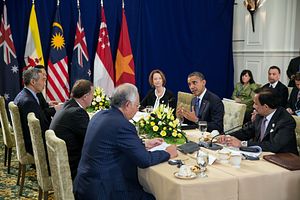U.S. President Barack Obama downplayed concerns about the future of America’s commitment to the Asia-Pacific Sunday as he prepared for a state visit with Singapore’s Prime Minister Lee Hsien Loong (See: “Advancing the US-Singapore Strategic Partnership”).
In a brief email interview with the Singapore newspaper The Straits Times, Obama said that he was confident that the so-called U.S. “rebalance” to the Asia-Pacific would endure because it is in the national interest of the United States, a reality that overcomes domestic political differences.
“I’m confident that America’s foreign policy rebalance to the region will endure beyond my presidency because it’s in the national interest of the United States,” Obama said.
“The United States has been a Pacific nation for over two centuries. That’s not going to change. That reality transcends election cycles,” he added.
Asked about whether the U.S. Congress would pass the Trans-Pacific Partnership (TPP) during the lame duck session, Obama only said that he was personally committed to TPP, which he called “a good deal,” and that in spite of the difficult politics around trade, Congress “will ultimately support” the deal.
Obama did not address whether the legislature would pass TPP before his term expires and, if not, whether the content of the agreement could be potentially altered, as some fear.
Pressed on how the United States would deal with China given its reluctance to recognize a landmark July 12 ruling on the Philippines’ South China Sea case against Beijing, Obama reiterated the U.S. commitment to a rules-based order and said Washington would continue to urge China and other claimant states to “work constructively to resolve these disagreements.”
Some have criticized the U.S. response to the ruling thus far as being too weak, even though administration officials say they have already carefully contemplated a range of options to take in response to future developments, including reactions from Beijing (See: “US South China Sea Policy After the Ruling: Opportunities and Challenges”).
































